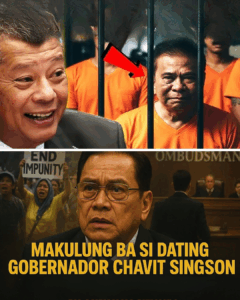FORMER GOVERNOR CHAVIT SINGSON FACES PLUNDER AND GRAFT CHARGES OVER ALLEGED LAND OVERPRICING AND ILLEGAL PRIVATIZATION IN NARVACAN

In a significant development in Philippine politics, former Ilocos Sur Governor Luis “Chavit” Singson is facing plunder and graft charges filed before the Office of the Ombudsman. The complaints, lodged by a group of farmers and fishermen from Narvacan, allege that Singson orchestrated the overpriced purchase of a 10-hectare property and the illegal privatization of a public foreshore area in the municipality.
THE ALLEGED OVERPRICED LAND DEAL
The crux of the plunder charge revolves around the acquisition of a 10-hectare property in Narvacan, which, according to the complainants, was purchased for ₱149.96 million—significantly higher than its assessed value of ₱49 million. The group contends that this transaction resulted in an overpayment of approximately ₱100 million, constituting a clear case of plunder. They further claim that Singson initiated and negotiated the purchase, with other municipal officials allegedly acting as co-conspirators. The complainants are seeking the restitution of the overpaid amount, preventive suspension of the involved officials, and a lifestyle check on the respondents.
ILLEGAL PRIVATIZATION OF PUBLIC FORESHORE AREA
In a separate graft complaint, the group accuses Singson and other officials of illegally occupying and privatizing a public foreshore area in Sulvec, Narvacan. This area, known locally as “Santorini,” was allegedly converted into a private resort without the necessary permits or environmental clearances. The complainants argue that this action deprived the public of their rightful access to the coastline and violated environmental laws. They are calling for the demolition of the unauthorized structures and the restoration of public access to the area.
SINGSON’S RESPONSE TO THE ALLEGATIONS
In response to the charges, Singson has vehemently denied any wrongdoing. He dismissed the allegations as politically motivated and part of a smear campaign against him. Singson expressed his intention to file countercharges and criticized the government’s focus on his case while other alleged corruption issues remain unaddressed. He also proposed the establishment of a revolutionary government led by the Supreme Court, a suggestion that has been met with skepticism and criticism from various sectors.
PUBLIC OUTRAGE AND CALLS FOR ACCOUNTABILITY
The filing of these charges has sparked public outrage, particularly among the residents of Narvacan. Thousands have taken to the streets, led by church groups and civil society organizations, to demand accountability and an end to political dynasties and corruption. Protesters have carried placards with slogans such as “Save Tiokan” and “End Dredging and Corruption,” highlighting their concerns over environmental degradation and the misuse of public funds.
THE LEGAL AND MORAL IMPLICATIONS
The plunder and graft charges against Singson are not merely legal matters; they also raise significant moral questions about the responsibilities of public officials. If proven true, the allegations suggest a pattern of abuse of power and disregard for public welfare. The case underscores the need for vigilance and transparency in governance, as well as the importance of holding leaders accountable for their actions.
CONCLUSION
As the Ombudsman investigates the charges against former Governor Chavit Singson, the people of Narvacan and the broader Filipino public await justice. The outcome of this case could have far-reaching implications for the fight against corruption and the promotion of good governance in the Philippines. It serves as a reminder that no one, regardless of their political stature, is above the law.
News
Minsan, isang batang nakakita ng mali sa mundo ang nagkaroon ng kapangyarihang magligtas bago pa man malaman ng iba kung ano ang nangyayari.
“Minsan, isang batang nakakita ng mali sa mundo ang nagkaroon ng kapangyarihang magligtas bago pa man malaman ng iba kung…
Handa na ba ang inyong mga puso para sa isang kwentong magpapakita na hindi lahat ng kumikinang ay ginto
“Handa na ba ang inyong mga puso para sa isang kwentong magpapakita na hindi lahat ng kumikinang ay ginto?” May…
Minsan, isang simpleng tanong ang maaaring baguhin ang takbo ng isang araw… at buksan ang pintuan ng nakalimutang kasaysayan
“Minsan, isang simpleng tanong ang maaaring baguhin ang takbo ng isang araw… at buksan ang pintuan ng nakalimutang kasaysayan.” Lumakad…
Ilang buwan na lang bago ang kasal. Pero tuwing mag-isa si Kenneth sa kwarto, hindi niya mapigilang tingnan ang kalendaryo, parang may mali
Ilang buwan na lang bago ang kasal. Pero tuwing mag-isa si Kenneth sa kwarto, hindi niya mapigilang tingnan ang kalendaryo,…
Sa gitna ng kaguluhan, may tawag na hindi mo kayang balewalain
“Sa gitna ng kaguluhan, may tawag na hindi mo kayang balewalain.” Isang maliwanag na umaga ng Oktubre sa San Francisco…
Paano mo haharapin ang bigat ng pagkawala… kung bigla mong mararamdaman na may milagro pa pala?
“Paano mo haharapin ang bigat ng pagkawala… kung bigla mong mararamdaman na may milagro pa pala?” Sa malawak at tahimik…
End of content
No more pages to load






